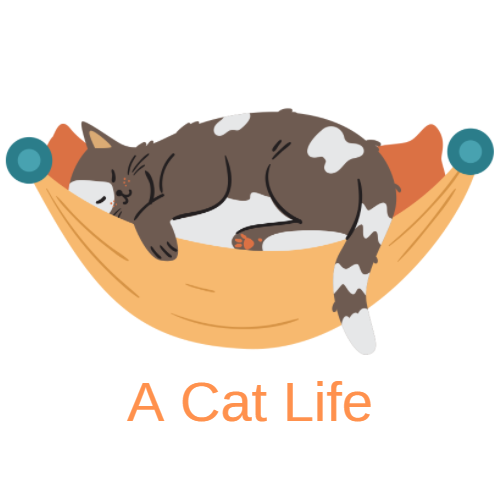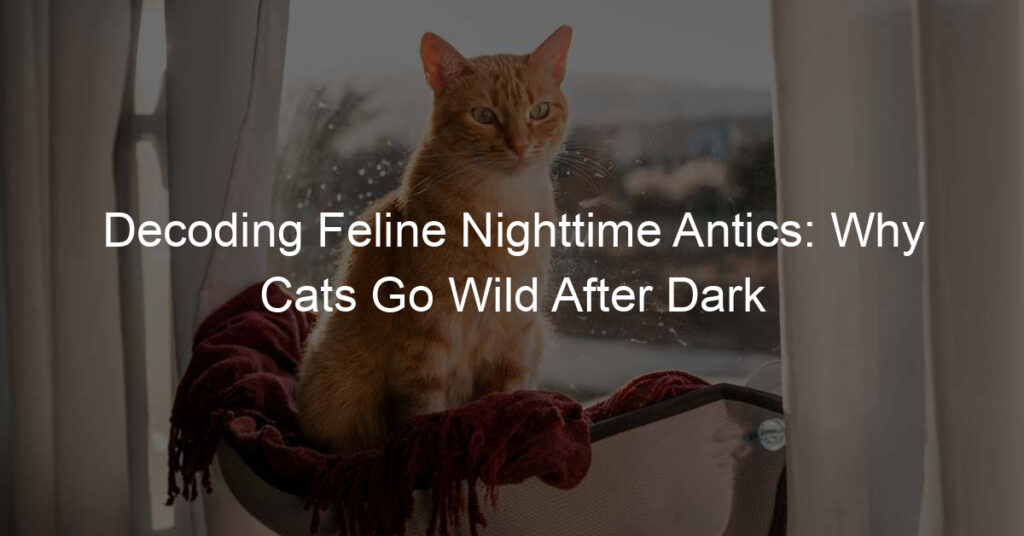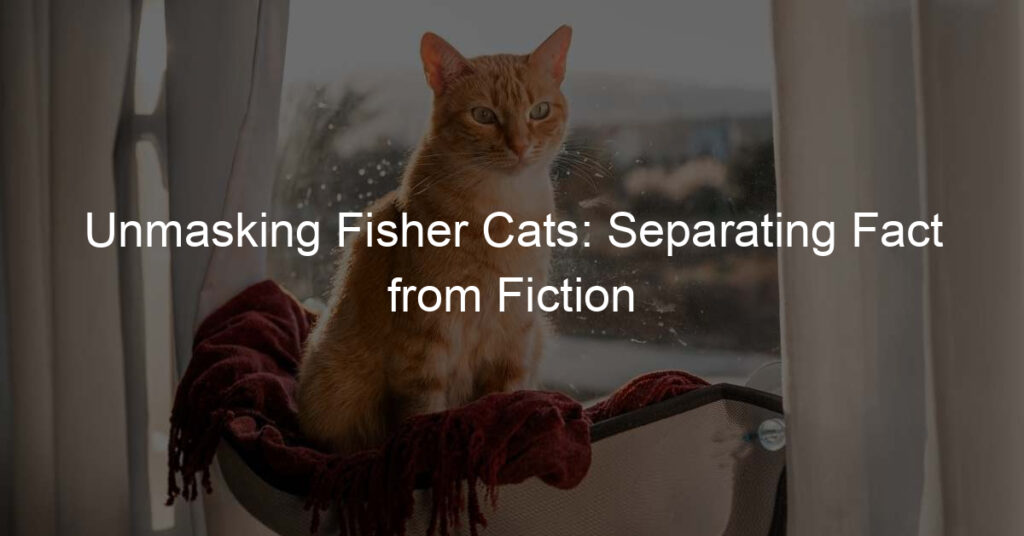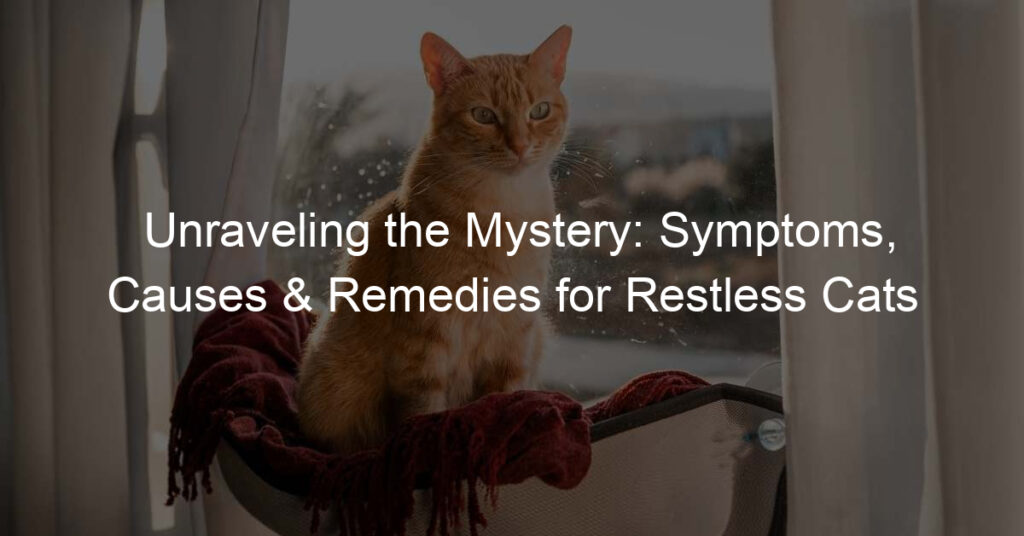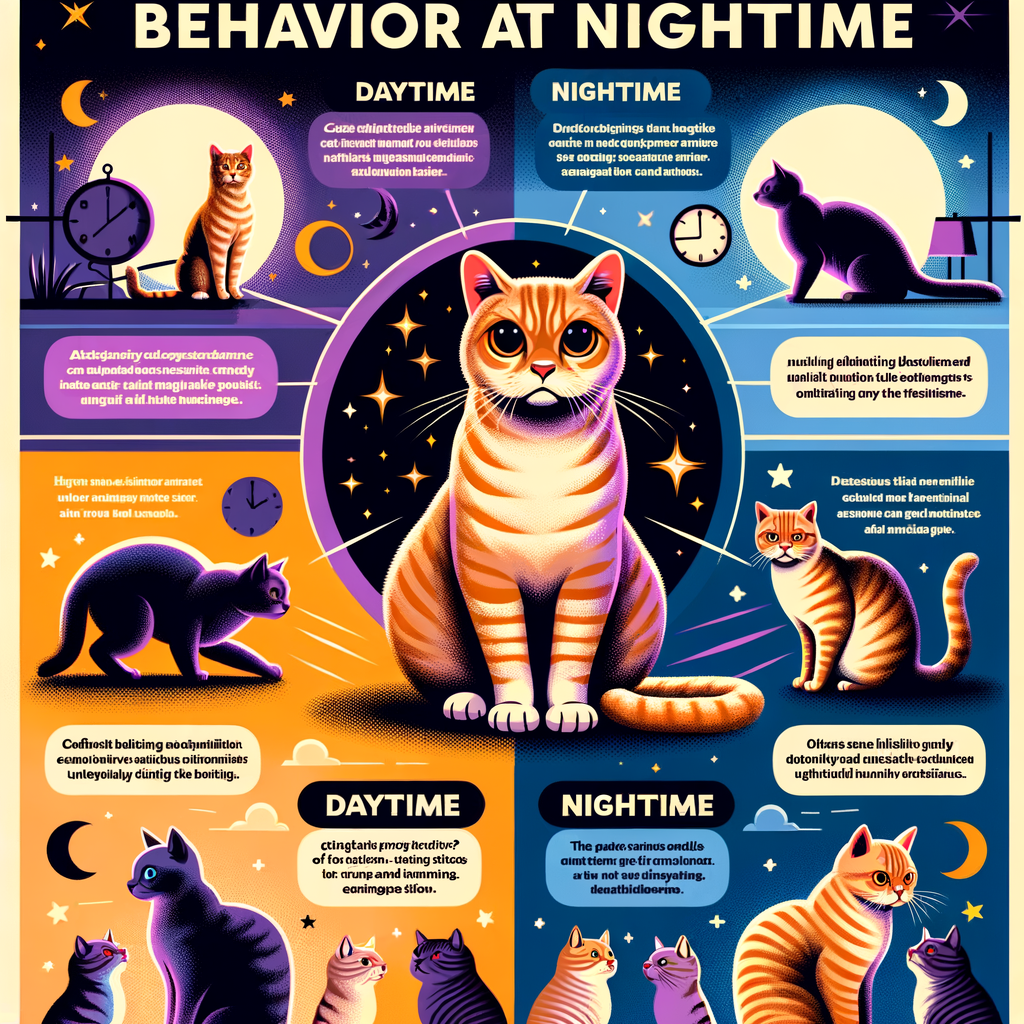
Introduction to Cat Behaviors at Night
Have you ever wondered why your feline friend seems to be more active at night? This article will give you a comprehensive understanding of your cat’s nocturnal behaviors. We’ll delve into the fascinating world of cats and their nighttime antics, providing you with insights and information to better understand your furry friend.
- Overview of nocturnal habits in cats
- Importance of understanding cat behavior
Cats, particularly those that are domesticated, exhibit a range of behaviors during the night. These behaviors can be traced back to their ancestors, who were primarily nocturnal creatures. Cats have retained some of these nocturnal habits, which can include hunting, playing, and exploring. During the night, cats may become more active, displaying behaviors such as running, jumping, and pouncing. These behaviors are a normal part of a cat’s life and are essential for their physical and mental well-being.
Understanding your cat’s behavior, especially their nocturnal habits, is crucial for several reasons. Firstly, it can help you better cater to their needs and ensure their well-being. Secondly, it can strengthen the bond between you and your cat as you gain a deeper understanding of their habits and behaviors. Lastly, understanding your cat’s behavior can help you identify any changes that may indicate health issues. For instance, a sudden change in your cat’s nighttime behavior could be a sign of illness or distress.
In the following sections, we will delve deeper into the reasons behind your cat’s nocturnal behavior, take a closer look at their night activities, and provide scientific explanations for their actions. We will also share some interesting case studies to help you better understand your cat’s nighttime antics. So, stay tuned and get ready to decode the mysteries of your cat’s behavior at night.
Understanding Cat Behavior: The Basics
When it comes to understanding our feline friends, it’s important to grasp the basics of their behavior. Cats are complex creatures with unique personalities, and their behavior can often seem mysterious to us. However, with a bit of knowledge, we can begin to understand why they act the way they do.
- General Cat Behavior Explained
Cats are known for their independence and aloofness, but they are also capable of showing affection and loyalty. They communicate through a variety of ways such as vocalizations, body language, and scent marking. For instance, a purring cat is usually content, while a hissing or growling cat is likely scared or angry. A cat rubbing against your leg is marking you with its scent, signaling that you are part of its territory.
Cats also have a natural hunting instinct. They love to chase, pounce, and play, which is why they often enjoy toys that mimic prey, like feathers or laser pointers. It’s important to provide plenty of playtime for your cat to satisfy this instinct and keep them happy and healthy.
- How Cat Behavior Differs During Day and Night
Cats are crepuscular, which means they are most active during the dawn and dusk. This is a trait they’ve inherited from their wild ancestors who hunted during these times to avoid larger predators that were active during the day.
During the day, cats often spend their time sleeping or resting. They may also engage in grooming, exploring their environment, or playing. At night, however, their behavior can change dramatically. They may become more active, running around, playing, and hunting. Some cats may also become more vocal at night, meowing or yowling for attention.
Understanding these basic behaviors can help you better understand and care for your cat. Remember, every cat is unique and may not fit these general behaviors exactly. The key is to pay attention to your cat’s individual behavior and respond accordingly.
Reasons for Cat’s Nocturnal Behavior
Understanding why your cat becomes more active at night can help you better manage their behavior and ensure they are healthy and happy. There are several reasons why cats exhibit nocturnal behavior. Let’s explore them in detail.
- Natural Hunting Instincts
- Changes in Household Environment at Night
- Health Issues Affecting Cat’s Night Activities
Cats are naturally nocturnal creatures. In the wild, they use the cover of darkness to hunt their prey. This instinct doesn’t disappear just because they are domesticated. Your cat might be up and about at night because its natural instincts are telling it to hunt. It’s not uncommon for cats to pounce on their toys or even your toes in the middle of the night!
Changes in the environment can also affect your cat’s behavior. For example, if your house becomes quieter at night, your cat might feel more comfortable exploring. On the other hand, if there are noises that scare your cat during the day, they might be more active at night when things are calmer. It’s important to note that changes in routine can confuse your cat and lead to increased nighttime activity.
Health issues can also affect your cat’s nighttime behavior. If your cat is suddenly more active at night, it could be a sign of a health problem. For example, older cats might suffer from a condition called cognitive dysfunction syndrome, which can disrupt their sleep patterns. If you notice any sudden changes in your cat’s behavior, it’s always a good idea to consult with a vet.
In conclusion, understanding the reasons behind your cat’s nocturnal behavior can help you better accommodate their needs and ensure they are comfortable and happy. Remember, every cat is unique and what works for one might not work for another. It’s all about understanding your cat and working with their natural instincts and behaviors.
Cat’s Night Activities: A Closer Look
As we delve deeper into the nocturnal activities of our feline friends, we will discover that their nighttime behavior is a fascinating blend of playfulness, vocalization, and restlessness. Let’s take a closer look at these common behaviors.
Common Nighttime Behaviors of Cats
- Playful antics: Cats are known for their playful antics, especially at night. This is because cats are crepuscular, which means they are most active during the twilight hours of dawn and dusk. Their playful behavior includes chasing, pouncing, and batting at objects. This is a natural instinct for cats, as it mimics the hunting behaviors of their wild ancestors.
- Increased vocalization: You may notice your cat becomes more vocal at night. This can be due to a variety of reasons, such as seeking attention, expressing hunger, or showing signs of distress. It’s important to pay attention to the different sounds your cat makes, as each sound can have a different meaning.
- Restless wandering: Cats often wander restlessly at night, exploring their environment. This behavior can be attributed to their natural curiosity and their instinct to hunt. If your cat seems excessively restless, it may be a sign of boredom or stress, and providing them with toys or a stimulating environment can help.
In conclusion, understanding your cat’s nighttime behavior can provide valuable insights into their health and well-being. It’s important to remember that while these behaviors are common, each cat is unique and may exhibit different behaviors. Always consult with a veterinarian if you notice any drastic changes in your cat’s behavior.
Unusual Nighttime Behaviors in Cats
While cats are known for their playful antics and increased vocalization during the night, there are some behaviors that may seem unusual or out of the ordinary. These behaviors can be a cause for concern and may require further investigation. Let’s take a closer look at some of these unusual nighttime behaviors in cats.
- Excessive Meowing or Yowling
- Aggressive Behavior
- Unusual Hiding Habits
While it’s normal for cats to be more vocal at night, excessive meowing or yowling can indicate a problem. This behavior could be a sign of distress, discomfort, or even a medical issue. For example, a cat suffering from hyperthyroidism, a common condition in older cats, may exhibit increased vocalization.
Aggression in cats can manifest in various ways, such as hissing, scratching, or biting. If your cat suddenly becomes aggressive at night, it could be due to a variety of reasons. It might be reacting to a perceived threat, or it could be experiencing pain or discomfort. In some cases, aggression can also be a sign of a neurological issue.
Cats are known for their love of hiding spots. However, if your cat is hiding more than usual, especially at night, it could be a sign of fear or anxiety. Unusual hiding habits can also be a sign of illness. If your cat is hiding and also showing other signs of illness such as loss of appetite or changes in behavior, it’s important to consult with a vet.
Understanding your cat’s behavior is key to ensuring their health and happiness. If you notice any unusual behaviors in your cat, especially at night, it’s important to seek professional advice. Remember, every cat is unique and what may be normal behavior for one cat could be a sign of distress in another.
Why Do Cats Act Differently at Night: Scientific Explanation
Have you ever wondered why your feline friend seems to be more active at night? The answer lies in science. Let’s delve into two main factors that explain this behavior: the role of circadian rhythms and the impact of domestication on cats’ nocturnal habits.
- Role of Circadian Rhythms in Cat Behavior
- Impact of Domestication on Cat’s Nocturnal Habits
Circadian rhythms are internal clocks that regulate the sleep-wake cycle in many living organisms, including cats. These rhythms are influenced by light and darkness, which is why they are often associated with day and night. In the wild, cats are primarily crepuscular, meaning they are most active during twilight hours (dawn and dusk). This behavior is a result of their circadian rhythms.
At night, when the house is quiet and humans are asleep, domestic cats may revert to this natural rhythm, becoming more active. This can include behaviors such as hunting, playing, or exploring. So, if your cat seems to have a burst of energy at night, it’s likely due to their internal clock telling them it’s time to be active.
Domestication has significantly influenced the behavior of cats, including their sleep-wake cycles. Unlike their wild counterparts, domestic cats have adapted to human schedules to some extent. However, their natural instincts can still drive them to be active during the night.
It’s important to remember that each cat is unique and may not strictly adhere to the typical feline sleep-wake cycle. Factors such as age, health, and individual personality can also influence a cat’s nocturnal habits. For instance, older cats may sleep more and be less active at night compared to younger ones.
In conclusion, the nocturnal habits of cats can be attributed to both their circadian rhythms and the impact of domestication. Understanding these factors can help cat owners better accommodate their pets’ needs and behaviors.
Case Studies: Understanding Nocturnal Cat Behavior
Let’s delve into some real-life examples to better understand how various factors can influence your cat’s nighttime behavior. We’ll look at two case studies that highlight how health issues and environmental changes can affect your cat’s nocturnal activities.
-
Case Study 1: Changes in Cat Behavior During the Night Due to Health Issues
Our first case study involves a 7-year-old domestic shorthair cat named Whiskers. Whiskers was known for being a calm and quiet cat during the night. However, his owners started noticing a change in his behavior. He became more active, restless, and started meowing loudly during the night.
Concerned, they took Whiskers to the vet. After a thorough examination, the vet diagnosed Whiskers with hyperthyroidism, a condition that can cause increased activity and vocalization. Once Whiskers started treatment, his nocturnal behavior returned to normal.
This case study emphasizes the importance of monitoring your cat’s behavior for any sudden changes. If your cat starts acting differently at night, it could be a sign of underlying health issues.
-
Case Study 2: Impact of Environmental Changes on Cat’s Night Activities
Our second case study focuses on a 3-year-old Siamese cat named Bella. Bella was used to a quiet and predictable environment. However, when her owners moved to a new house near a busy road, Bella’s nighttime behavior changed drastically.
She became more anxious and started hiding at night. She also became less active and spent most of the night awake, staring out the window. After consulting with a cat behaviorist, Bella’s owners made some changes to her environment, such as adding sound-proofing to the windows and providing Bella with a safe, quiet space to retreat to at night.
Over time, Bella’s nocturnal behavior improved, showing that environmental changes can significantly impact a cat’s nighttime activities. It’s crucial to provide a safe and comfortable environment for your cat, especially during the night when they are more active.
These case studies show that understanding your cat’s nocturnal behavior can give you valuable insights into their health and wellbeing. Always pay attention to any changes in your cat’s behavior, and don’t hesitate to seek professional advice if you notice anything unusual.
Key Takeaways: Decoding Your Cat’s Nighttime Antics
After exploring the fascinating world of feline behavior at night, we have gathered some crucial insights. These key takeaways can help you better understand and manage your cat’s nocturnal antics.
- Importance of observing and understanding your cat’s behavior
- When to seek veterinary help for unusual nighttime behaviors
- Practical tips for managing your cat’s nocturnal antics
Observing your cat’s behavior is the first step towards understanding their nighttime antics. Cats are naturally nocturnal creatures, and their behavior can vary greatly from their daytime activities. By paying close attention to your cat’s actions, you can begin to decode their unique language and understand their needs better. For instance, a cat that is excessively active at night might be trying to burn off excess energy or might be bored and seeking stimulation.
While most nighttime behaviors are normal for cats, some actions might indicate a health issue. If your cat is excessively vocal, restless, or shows signs of distress like excessive grooming or loss of appetite, it might be time to seek veterinary help. Unusual behaviors can be a sign of various health issues, including hyperthyroidism, arthritis, or even dental disease. Remember, early detection and treatment can make a significant difference in your cat’s health.
Managing your cat’s nighttime behavior can be a challenge, but with a few practical tips, you can ensure a peaceful night for both you and your feline friend. Try to engage your cat in play activities during the day to burn off excess energy. Provide toys and puzzles to keep them stimulated. A well-fed cat is a happy cat, so try feeding them a substantial meal before bedtime. Lastly, ensure they have a comfortable and quiet place to sleep.
In conclusion, understanding your cat’s nighttime behavior is a journey of observation, understanding, and adaptation. With patience and care, you can ensure a harmonious co-existence with your nocturnal companion.
